- Clone
- TS1/18 (See other available formats)
- Regulatory Status
- RUO
- Workshop
- V AS162
- Other Names
- Integrin β2 subunit, LFA -1 β subunit, β2 integrin, ITGB2
- Isotype
- Mouse IgG1, κ
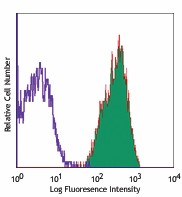
-

Human peripheral blood lymphocytes stained with TS1/18 PE/Cyanine5
| Cat # | Size | Price | Quantity Check Availability | ||
|---|---|---|---|---|---|
| 302109 | 25 tests | $129.00 | |||
CD18 is a 90-95 kD type I transmembrane protein also known as integrin β2 subunit, LFA-1 β subunit, and β2 integrin. CD18 non-covalently associates with CD11a, CD11b or CD11c. CD18 is expressed on all leukocytes. CD18 and associated α chains function in adhesion and signaling in hematopoietic cells.
Product Details
- Verified Reactivity
- Human
- Reported Reactivity
- Pig
- Antibody Type
- Monoclonal
- Host Species
- Mouse
- Formulation
- Phosphate-buffered solution, pH 7.2, containing 0.09% sodium azide and BSA (origin USA)
- Preparation
- The antibody was purified by affinity chromatography, and conjugated with PE/Cyanine5 under optimal conditions.
- Concentration
- Lot-specific (to obtain lot-specific concentration, please enter the lot number in our Concentration and Expiration Lookup or Certificate of Analysis online tools.)
- Storage & Handling
- The antibody solution should be stored undiluted between 2°C and 8°C, and protected from prolonged exposure to light. Do not freeze.
- Application
-
FC - Quality tested
- Recommended Usage
-
Each lot of this antibody is quality control tested by immunofluorescent staining with flow cytometric analysis. For flow cytometric staining, the suggested use of this reagent is 5 µl per million cells in 100 µl staining volume or 5 µl per 100 µl of whole blood.
- Excitation Laser
-
Blue Laser (488 nm)
Green Laser (532 nm)/Yellow-Green Laser (561 nm)
- Application Notes
-
Additional reported applications (for the relevant formats) include: inhibition of cell adhesion and migration3,4. The Ultra-LEAF™ purified antibody (Endotoxin < 0.01 EU/µg, Azide-Free, 0.2 µm filtered) (Cat. No. 302116) is recommended for functional assays.
-
Application References
(PubMed link indicates BioLegend citation) -
- Schlossman S, et al. 1995. Leucocyte Typing V. Oxford University Press. New York.
- Kishimoto T, et al. 1997. Leucocyte Typing VI. Garland Press. London.
- Van Epps DE, et al. 1989. J. Immunol. 143:3207. (Block)
- Meerschaert J, et al. 1994. J. Immunol. 152:1915. (Block)
- Sithu SD, et al. 2007. J. Biol. Chem. doi:10.1074/jbc.M611273200.
- Sommaggio R, et al. 2012. J. Immunol. 188:2075. PubMed
- Valenzuela NM, et al. 2013. J. Immunol. 190:6635. PubMed
- Product Citations
-
- RRID
-
AB_314227 (BioLegend Cat. No. 302109)
Antigen Details
- Structure
- Integrin, type I transmembrane glycoprotein, associates with CD11a, CD11b, or CD11c, 90-95 kD
- Distribution
-
Leukocytes
- Function
- Adhesion and signaling in hematopoietic system
- Ligand/Receptor
- ICAMs
- Cell Type
- Leukocytes, Tregs
- Biology Area
- Cell Adhesion, Cell Biology, Immunology, Innate Immunity
- Molecular Family
- Adhesion Molecules, CD Molecules
- Antigen References
-
1. Anderson D, et al. 1987. Annu. Rev. Med. 38:175.
2. Springer T. 1994. Cell 76:301. - Gene ID
- 3689 View all products for this Gene ID
- UniProt
- View information about CD18 on UniProt.org
Other Formats
View All CD18 Reagents Request Custom Conjugation| Description | Clone | Applications |
|---|---|---|
| FITC anti-human CD18 | TS1/18 | FC |
| PE anti-human CD18 | TS1/18 | FC |
| PE/Cyanine5 anti-human CD18 | TS1/18 | FC |
| Purified anti-human CD18 | TS1/18 | FC,Block |
| APC anti-human CD18 | TS1/18 | FC |
| Ultra-LEAF™ Purified anti-human CD18 | TS1/18 | FC,Block |
| PE/Cyanine7 anti-human CD18 | TS1/18 | FC |
| PerCP/Cyanine5.5 anti-human CD18 | TS1/18 | FC |
| PE/Dazzle™ 594 anti-human CD18 | TS1/18 | FC |
| TotalSeq™-A0385 anti-human CD18 | TS1/18 | PG |
| Alexa Fluor® 700 anti-human CD18 | TS1/18 | FC |
| APC/Fire™ 750 anti-human CD18 | TS1/18 | FC |
| TotalSeq™-C0385 anti-human CD18 | TS1/18 | PG |
| TotalSeq™-B0385 anti-human CD18 | TS1/18 | PG |
| APC/Cyanine7 anti-human CD18 | TS1/18 | FC |
Compare Data Across All Formats
This data display is provided for general comparisons between formats.
Your actual data may vary due to variations in samples, target cells, instruments and their settings, staining conditions, and other factors.
If you need assistance with selecting the best format contact our expert technical support team.
-
FITC anti-human CD18
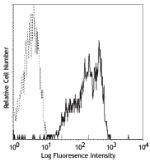
Human peripheral blood lymphocytes stained with TS1/18 FITC -
PE anti-human CD18
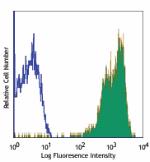
Human peripheral blood lymphocytes stained with TS1/18 PE 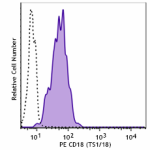
Pre-lysed human blood leukocytes were stained with CD18 (clo... -
PE/Cyanine5 anti-human CD18
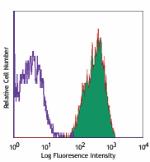
Human peripheral blood lymphocytes stained with TS1/18 PE/Cy... -
Purified anti-human CD18
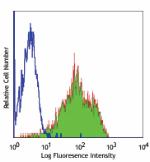
Human peripheral blood lymphocytes stained with purified TS1... -
APC anti-human CD18
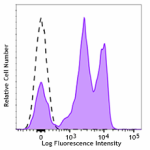
Human peripheral blood lymphocytes were stained with CD18 (c... -
Ultra-LEAF™ Purified anti-human CD18

Human peripheral blood lymphocytes stained with purified TS1... -
PE/Cyanine7 anti-human CD18
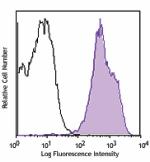
Human peripheral blood lymphocytes were stained with CD18 (c... -
PerCP/Cyanine5.5 anti-human CD18
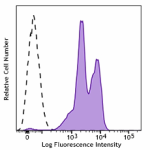
Human peripheral blood lymphocytes were stained with CD18 (c... -
PE/Dazzle™ 594 anti-human CD18
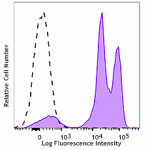
Human peripheral blood lymphocytes were stained with CD18 (c... -
TotalSeq™-A0385 anti-human CD18
-
Alexa Fluor® 700 anti-human CD18
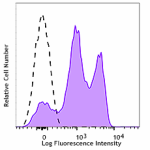
Human peripheral blood lymphocytes were stained with CD18 (c... -
APC/Fire™ 750 anti-human CD18
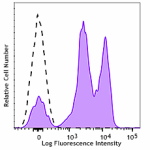
Human peripheral blood lymphocytes were stained with CD18 (c... -
TotalSeq™-C0385 anti-human CD18
-
TotalSeq™-B0385 anti-human CD18
-
APC/Cyanine7 anti-human CD18

Human peripheral blood lymphocytes were stained with anti-hu...
